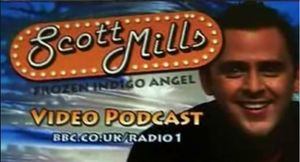Frozen Indigo Angel: Difference between revisions
From Perplex City Wiki
Jump to navigationJump to search
Edgemaster (talk | contribs) No edit summary |
Edgemaster (talk | contribs) m (formatting) |
||
| Line 1: | Line 1: | ||
{{Season2}} | {{Season2}} | ||
'''Frozen Indigo Angel''' was a trigger word placed into Radio 1 transmissions as part of a plan by [[the Third Power]]. | '''Frozen Indigo Angel''' was a trigger word placed into Radio 1 transmissions as part of a plan by [[the Third Power]]. | ||
Paul Denchfield, the producer of the BBC Radio 1's vodcasts discovered that these words had been inserted into a banner and the vodcast that he produced. He was fired by the BBC when he reported this to them, and continued to find the words scattered across Radio 1. | Paul Denchfield, the producer of the BBC Radio 1's vodcasts discovered that these words had been inserted into a banner and the vodcast that he produced. He was fired by the BBC when he reported this to them, and continued to find the words scattered across Radio 1. | ||
[[Image:FIABanner.jpg|thumb|right|Scott Mills' Vodcast banner, showing Frozen Indigo Angel]] | [[Image:FIABanner.jpg|thumb|right|Scott Mills' Vodcast banner, showing Frozen Indigo Angel]] | ||
At first they appeared in the stations music playlist (visible on digital radios, digital television, and the website). Then the the words started being played over the top of songs. | At first they appeared in the stations music playlist (visible on digital radios, digital television, and the website). Then the the words started being played over the top of songs. | ||
Revision as of 20:24, 13 May 2007
|
PERPLEX CITY, SEASON TWO |
Frozen Indigo Angel was a trigger word placed into Radio 1 transmissions as part of a plan by the Third Power.
Paul Denchfield, the producer of the BBC Radio 1's vodcasts discovered that these words had been inserted into a banner and the vodcast that he produced. He was fired by the BBC when he reported this to them, and continued to find the words scattered across Radio 1.
At first they appeared in the stations music playlist (visible on digital radios, digital television, and the website). Then the the words started being played over the top of songs.
